Your Warranty

All of our new build properties come with a warranty, usually of one year. During this time, the developer of your home is responsible for fixing defects in your property.
This warranty period starts when we receive the property from the developer, not the date on which you complete your purchase. For example, if your property was handed over to us in June 2021, but you purchased it in September 2021, your property warranty would expire in June 2022.
The warranty period applies only to brand new properties. If you’ve bought a pre-owned home, we will tell you whether any warranty period is left on your property.
All of our new build properties come with a warranty, usually of one year. During this time, the developer of your home is responsible for fixing defects in your property.
This warranty period starts when we receive the property from the developer, not the date on which you complete your purchase. For example, if your property was handed over to us in June 2021, but you purchased it in September 2021, your property warranty would expire in June 2022.
The warranty period applies only to brand new properties. If you’ve bought a pre-owned home, we will tell you whether any warranty period is left on your property.

A defect is any problem inside your home which the developer should fix under the warranty.
You need to report defects through our customer resolution centre. We will then log the defect, contact the developer, and give you a timescale for it to be resolved, depending on its urgency. For example, a boiler breaking down would be given a 24-hour target to be fixed whilst a faulty cupboard door would be given a 28-day target.
Examples of some commonly found defects include:
- A light fitting not working
- Doors dropping a little from their hinges
- Creaking cupboard doors
- A tap coming loose
Around the time your warranty period ends, we will come and inspect your home with the developers. During the inspection, we will log any defects that have not yet been fixed, and give you the chance to point out any other issues.
We will then make necessary appointments to fix the outstanding defects. Once these are all resolved, we will ask you to sign a form confirming that every defect has been repaired.
Apart from the developers’ warranty, your property is covered by an extended warranty, usually provided by either the NHBC, Zurich or BLP. These warranties typically last ten years and usually cover the following:
- Foundations
- Walls
- Wet-applied plaster
- External render and external vertical tile hanging
- Parts of the roof and roof coverings
- Ceilings
- Load-bearing parts of the floors
- Staircases and internal floor decking and screeds where these fail to support normal loads
- Double-glazing or triple glazing panes to external windows and doors
- Below-ground drainage for which the owner is responsible
There is usually a minimum amount that you can claim. There may also be a cost to making your claim.
If the claim is only about your property then you would be the person to contact the insurer. If the problem affects more than one property, we will be responsible for making a claim on your behalf.
Once you purchase your home, your solicitor will forward you the relevant certificate of insurance.
For more information on these extended warranties, please visit the NHBC, Zurich, and BLP websites.
- Shrinkage – cracks appearing on plaster walls and joints of wood, if smaller than an edge of a £1 coin.
- White goods – such as an oven, hob, washing machine, or fridge freezer are usually covered by the manufacturer’s warranty. You will need to contact the manufacturer to activate the warranty first.
- Pressurised heating systems – many hot water-based heating systems need a certain amount of water pressure to work. You will be given a demonstration on how to pressurise your boiler during the full property induction when you receive the keys.
- Problems caused by wear and tear, an accident, or misuse
If you report a defect which following a contractor’s visit is determined not to be a defect, it is likely that you will be charged for the cost of the contractor callout. Examples of wasted callouts include:
- claiming the heating was broken, when the system was not operated correctly,
- claiming no TV reception, when the aerial was not plugged in,
- damaging a cupboard through misuse.

